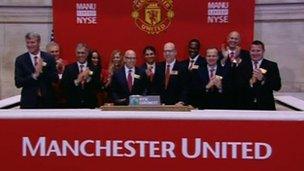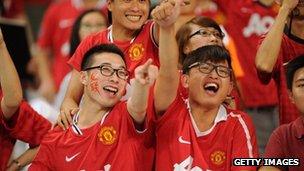Manchester United lowers stock float value
- Published
- comments

Manchester United executives rang the opening bell at the New York Stock Exchange
Manchester United has been forced to cut the value of its share flotation in New York.
The football club said it would sell shares at $14 each, external, below the $16-$20 range that it announced just weeks ago.
The club is selling shares representing 10% of the club, which will raise $233m (£150m) to pay off some debt, below the $333m hoped for.
The shares will begin trading shortly on the New York Stock Exchange.
The exchange's opening bell was rung by executives from the club, and some traders wore the club's shirts.
'Priced to fail'
The lowering of the debut share price suggests the club could not find buyers at the higher prices.
The shares will pay no dividend, and some analysts say that floating just 10% of the club does not give institutional investors enough of a return opportunity.
"I don't know who will buy these shares," Mike Jarman, chief market strategist for H20 Markets - a former professional footballer and a Manchester United fan himself - told the BBC.
"Maybe a few hedge funds will take a small punt of $5m-$10m, which if it goes bad, they can easily write off. But it's not going to be a long-term investment for those guys.
"Maybe for some super wealthy Asia or Russian investors having a slice of Man U in the portfolio is a bit sexy... but the deal is priced to fail."
Pete Hackleton, a partner in the London office of accounting firm Saffery Champness who specialises in the sport and entertainment businesses, agrees.
"If you are wealthy and want to buy a football club then I can see the attraction, but I don't know of any interest in the deal - and most football clubs that have floated are now back in private hands," says Mr Hackleton.
"UK fans will mostly still be wondering what will be done with the cash from the deal and how much of it will go to the club."
But Stefan Szymanski, an expert in sports economics from the University of Michigan, told the BBC that even with the lower share price, Manchester United is still "the most valuable sports franchise in the world, and the American investors are looking at this as a franchise".
"Given the way they have tried to sell this off, with no voting rights, no dividends, and limited disclosure [of financial information], it is a testament to the strength of Manchester United as a football club and its popularity internationally, that they have managed to do this well," he said.
Overseas expansion
In its prospectus, external, the 134-year-old club outlined its success on the pitch and the size of its fanbase, which generated a total global audience of four billion viewers in the 2010-11 season. Much of its future strategy is based on exploiting opportunities outside of the UK.
The club said its commercial revenue had grown from £66m in 2009 to £103m in 2011, thanks to sponsorship and merchandising deals.
It made a profit of £13m on continuing operations in 2011. It estimates that it will have made profits of £23m in 2012, but this includes a tax credit of almost £30m. Without that it would have made a loss, it said.
The Old Trafford-based firm said it intended to increase revenue and profits in coming years from sponsorship deals, sales of Manchester United branded products, broadcasting rights and improving its new media and mobile offerings.
It has opened an office in Asia to try to attract new sponsors there, and is in the process of opening another one in North America.
It already has retail shops in Singapore, Macao, India and Thailand to try to capitalise on its popularity in Asia, and intends to open more in the coming years, the club said.
Disappointment
Some supporters had hoped that the money raised by selling shares in the club would all go towards reducing the debt load.
A statement from the Manchester United Supporters Trust (MUST) criticised the money-raising plan: "We have made it clear that on the Glazers' terms, the share sale is a bad deal for fans, investors and the club.

Manchester United has a huge global fan base that they are seeking to capitalise on
"For the club, this is a bad deal because more than half of the funds raised will now be paid direct to the Glazer family, with a smaller portion being used to pay down some of their debt which they have saddled the club with since 2005."
Earlier this month, MUST called for a boycott of the club's sponsors in protest at the planned share issue.
It said this was intended to send "a loud and clear message to the Glazer family and club sponsors that, without the support and purchasing power of the fans, the global strength of the Manchester United brand doesn't actually exist".
High debts
Manchester United has been controlled since 2005 by billionaire US sports investors the Glazer family, which paid £800m for the club.
They also own the Tampa Bay Buccaneers American football team.
The shares will begin trading in New York on Friday under the ticker name Manu.
It estimates that as a result of the share sale it will be able to reduce its debts from £423m to £345m.
Sir Alex Ferguson, the manager, recently denied speculation that he stands to benefit financially from the imminent share flotation, after reports that club employees would benefit from a share incentive scheme.
"There is not a single grain of truth in this allegation," he said in a statement.
The Premier League giant came second last season and has won a record 19 titles.